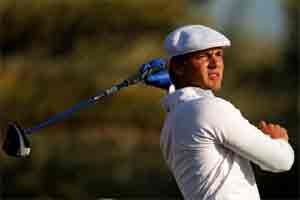Golf, like every other sport, needs heroes. And more often than not, the players who generate the most intrigue are ones who buck the trend and march to the beat of their own drums. Not surprisingly, this needs a surfeit of raw talent: think Rickie Fowler with his unorthodox swing and American baseball-esque swag; Bubba Watson’s outrageous golf shots and homemade swing; or our very own Jeev Milkha Singh, with his unique action. The simple truth of the matter is that it takes an incredible amount of self-belief for a pro to defy golfing conventions—whether it’s the technicalities of the golf swing, or the game’s well-established traditions.
The silver medal-winner at Augusta Masters 2016 and now the PGA Tour’s newest pro, 22-year-old Bryson DeChambeau, is already the most googled player on the planet. To be fair, the surge of interest in the young player from California can be justified purely on the basis of his performances in the last one year. He achieved the rare feat of winning the NCAA and US Amateur championships in 2015—only the fifth player to do so in the history of the game after Jack Nicklaus, Phil Mickelson, Tiger Woods and Ryan Moore. Of the seven pro tournaments he played as an amateur before the Masters, DeChambeau made the weekend in six, and even notched up a tied-second at the 2015 Australian Masters. At Augusta, DeChambeau began his campaign paired in the opening round with defending champion Jordan Spieth and Paul Casey. Given the momentousness of the occasion—first competitive round at Augusta National in such exalted company—not only did DeChambeau appear comfortable and immune to the immense pressure, but shot a very creditable even-par 72. It was an astonishing performance, which upended the very definition of an ‘amateur’. The younger Spieth—possibly the most accomplished golfer on the planet right now—was thoroughly impressed. “I felt like Bryson struck the ball much better than I did,” he said after shooting a stellar six-under 66 to lead the tournament after the first round. “In all honesty, it was really impressive watching his game today. I’ve played with him many times now, and to see it come to kind of be as sharp as I’ve seen it. I felt like, he was a bit off on the greens and still was able to shoot even par. That’s really, really impressive in your first round here.”
DeChambeau was breathing down Spieth’s neck till the last hole of the second round where a triple bogey derailed what was an outstanding round (another even-par 72). The rookie contended over the weekend and finished an outstanding tied-21st in his first and last Masters tournament as an amateur.
Throughout the Masters week, DeChambeau was in the news, not on account of his splendid showing, but rather his cool demeanour, and his bold matter-of-fact statements about winning the tournament. After the second round and the disaster on the 18th, he remarked unflappably: “There are still 36 holes to go, and anything can happen,” he said remarkably unperturbed. People think, ‘Oh, my gosh, he was nervous.’ No, I wasn’t nervous. I pulled two shots. It’s a disappointing factor. But again, that’s golf. You’ve got to learn from that and play your best tomorrow.”
Now, with details of DeChambeau’s obsession with winning at Augusta emerging, that confidence doesn’t seem so misplaced given his deep-rooted desire to win the tournament…as an amateur. Talk about aiming for the sun: the very notion of wanting to win the Masters Tournament on your debut, while an amateur is so far reaching that it gives away this young man’s physiology. The youngster’s prep for the Masters stretches back months during which he sought out and played rounds with a string of Masters-winners ranging from Ben Crenshaw and Phil Mickelson. He even spent two hours with CBS Sports announcer Jim Nantz, borrowing DVDs of recent Masters so he could study hole locations, par-5 layup areas and subtle breaks on the greens.This much is clear: DeChambeau was serious about contending for the title, not the silver medal for amateurs.
It has been done before. Immortalised in the Hollywood flick, The Greatest Game, the amateur Francis Ouimet outclassed Harry Vardon and Eddie Lowery at the 1913 US Open and Billoo Sethi won the Indian Open as an amateur in 1965. But these have been anomalies, rather than the norm. Amateurs historically do not have the kind of experience or mental strength to handle the pressure and rigour of winning a pro tournament, let alone a Major. And then there’s the thing about playing for money that changes the entire complexion of a game into a vocation. There is no dearth of amateurs who’ve been on top of their game before turning pro, and then lost the plot, sometimes quite inexplicably.
By all indications, DeChambeau is already past that moment: in his pro debut last week, at the RBC Heritage Open, he finished tied fourth: pro debuts don’t get better than that.
What really got the world’s attention on DeChambeau though wasn’t his play—which was stellar or his style statement (he wears the Hogan cap)—but rather that the physics major plays with irons that have the same length shaft: approximately the length of a six-iron. If you’re looking for a testament to DeChambeau’s understanding of the golf swing, and his confidence in his own abilities to do something no other professional in the world would try, then this is it. Not only has he shown that single-length irons, contrary to popular wisdom, can work, but work well enough for major manufacturers to take note and introduce the concept to their equipment lines. This boy is already a gamechanger.
A golfer, Meraj Shah also writes about the game

